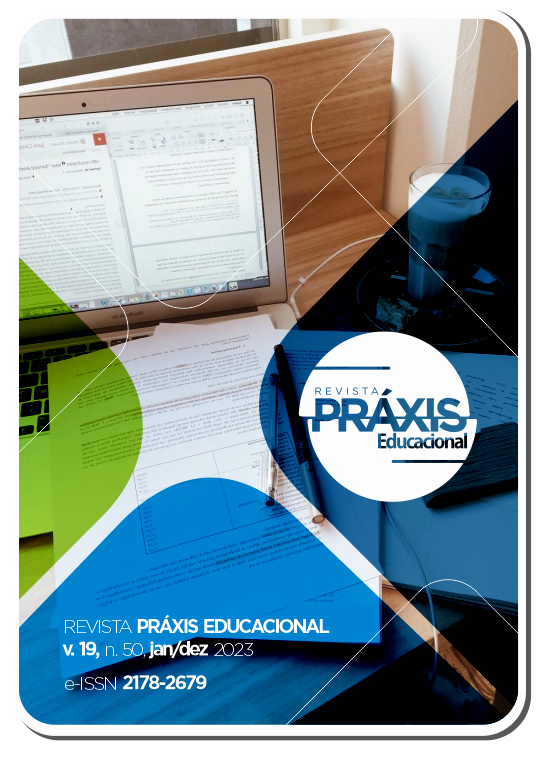The other school: lessons from latin american experiences from an agroecological perspective
DOI:
https://doi.org/10.22481/praxisedu.v19i50.13699Keywords:
subject, educational experience, population education, rural educationAbstract
This paper highlights the importance of the subject as a source of knowledge and potential reconfiguration in educational processes of agroecological transformations. It shows how the symphony of four Latin American experiences in social organization—in their way of seeing, understanding, and transforming reality—reveal a political subject under construction. In these processes, teaching and learning relate to other ways of doing and thinking about agriculture, and agroecologies come into play as a powerful driving force that promote collective action in the community through popular educational processes. This education promotes and favors the visibility and protagonism of the subjects and their communities through the recognition of their practices and knowledge. This allows us to approach new coordinates of understanding in politics, and of the subject, subjectivities, discourses, and popular narratives that oppose the logics of power and its forms of control, domination, and appropriation. These are challenging spaces to learn, listen and dialogue with other forms of understanding coming from different places of enunciation, and to value the richness of territories and the thinking subjects that transform them.
Downloads
Metrics
References
Barbosa, Lía y Sollano, Marcela. (2014). La Educación Autónoma Zapatista en la formación de los sujetos de la educación: otras epistemes, otros horizontes. Intersticios de la política y la cultura. Intervenciones latinoamericanas, 3(6), 67-89.
Baronnet, Bruno. (2021). Autonomía zapatista y escuelas en resistencia: ser educador en los municipios autónomos de Chiapas. Pensar las autonomías. Experiencias de autogestión, poder popular y autonomía, p. 199. México: Bajo Tierra A.C.
Berlanga, Benjamín. (2013). Venir siendo sujeto: la educación como lugar de florecimiento de una subjetividad que se pone a sí mismo como sujeto. Puebla: Universidad Campesina e Indígena en Red.
Bolaños, Graciela. (2012). La educación propia: una realidad de resistencia educativa y cultural de los pueblos. Educación y ciudad, (22), 45-56.
Boldt, Charlotte; Barbosa, Lía y Salazar, Tania. (2021). Pedagógica de semilla en el Movimiento Zapatista: siembra y crecimiento de un sujeto colectivo político. Revista Práxis Educacional, 17(46), 441-464.
Bubnova, Tatiana. (2006). Voz, sentido y diálogo en Bajtín. Acta poética, 27(1), 97-114.
Domené-Painenao, Olga & Herrera, Francisco. (2019). Situated agroecology: Massification and reclaiming university programs in Venezuela. Agroecology and Sustainable Food Systems, 43(7-8), 936-953.
Domené-Painenao, Olga; Mier y Terán-Giménez Cacho, Mateo; Limón-Aguirre, Fernando; Rosset, Peter y Contreras-Natera, Miguel. (2020). Construcción territorial de agroecologías situadas: El Maestro Pueblo en Sanare, estado Lara-Venezuela. Estudios sociales. Revista de alimentación contemporánea y desarrollo regional, 30(56), e20961.
Dussel, Enrique. (1992). 1492: El encubrimiento del otro. El origen del mito de la modernidad. Santafé de Bogotá, DC, Colombia: Ediciones Ántropos.
Escalona, Juan y Escalona, Roberto. (2011). El Maestro Pueblo. Serie Luces para la América. Caracas: Ministerio del Poder Popular para la Educación Universitaria.
Escobar, Arturo. (2021). Reframing civilization (s): From critique to transitions. Globalizations, 1-18.
Fals-Borda, Orlando. (2008). El socialismo raizal y la Gran Colombia bolivariana: investigación acción participativa. Caracas: Fundación Editorial El perro y la rana.
Foucault, Michel. (1992). Microfísica del poder. (en español; J. Varela y F. Alvarez-Uría, trads.). Madrid: Las Ediciones de la Piqueta.
Freire, Paulo. (2014). Pedagogía de la esperanza: un reencuentro con la pedagogía del oprimido. México: Siglo XXI Editores.
González-Terreros, María y Torres-Carrillo, Alfonso. (2020). Educación popular y educación propia: diálogos desde experiencias educativas en Cauca. Revista Colombiana de Educación, (80), 335-354.
Guattari, Félix. (2006). Micropolítica: cartografías del deseo. Madrid: Traficantes de Sueños.
Halvorsen, Sam; Bernardo, Mançano & Fernanda, Torres. (2019). Mobilizing Territory: Socioterritorial Movements in Comparative Perspective. Annals of the American Association of Geographers, 109:5, 1454-1470.
Meek, David & Tarlau, Rebecca. (2016) Critical food systems education (CFSE): educating for food sovereignty. Agroecology and Sustainable Food Systems, 40:3, 237-260.
Mier y Terán, Mateo; Giraldo, Omar; Aldasoro, Miriam; Morales, Helda; Ferguson, Bruce; Rosset, Peter ... & Carmen, Campos. (2018). Bringing agroecology to scale: Key drivers and emblematic cases. Agroecology and sustainable food systems, 42(6), 637-665.
Morin, Edgar. (2020). La mente bien ordenada: repensar la reforma, reformar el pensamiento. México: Siglo XXI Editores.
Liu, Yansui & Li, Yansui. (2017). Revitalize the world’s countryside. Nature, 548(7667), 275-277.
Rojas Martínez, Axel. (2005). ¿Qué pasaría si la escuela? 30 años de construcción de una educación propia. Revista Colombiana de Educación, (48).
Schütz, Alfred. (1951). Making music together: A study in social relationship. Social research, 76-97.
Ulloa, Astrid. (2021). Repolitizar la vida, defender los cuerpos-territorios y colectivizar las acciones desde los feminismos indígenas. Ecología Política, 61, 38–48.
Val, Valentín; Rosset, Peter; Zamora, Carla; Giraldo, Omar & Rocheleau, Diane. (2019). Agroecology and La Via Campesina I. The symbolic and material construction of agroecology through the dispositive of “peasant-to-peasant” processes. Agroecology and Sustainable Food Systems, 43(7-8), 872-894.
Walsh, Catherine. (2014). Pedagogías decoloniales caminando y preguntando: notas a Paulo Freire desde Abya Yala. Entramados: educación y sociedad, (1), 17-30.
Zemelman, Hugo. (2021). Pensar teórico y pensar epistémico: los retos de las ciencias sociales latinoamericanas. Espacio Abierto, 30(3), 234-244.
Downloads
Published
How to Cite
Issue
Section
License
Copyright (c) 2023 Práxis Educacional

This work is licensed under a Creative Commons Attribution-ShareAlike 4.0 International License.
You are free to:
Share - copy and redistribute the material in any medium or format; Adapt - remix, transform, and build from the material for any purpose, even commercially. This license is acceptable for Free Cultural Works. The licensor cannot revoke these freedoms as long as you follow the terms of the license.
Under the following terms:
Attribution - You must appropriately give credit, provide a link to the license, and indicate if any changes have been made. You may do so in any reasonable way, but not in a way that suggests that you or your use is endorsed by the licensor.
There are no additional restrictions - You cannot apply legal terms or technological measures that legally restrict others to make any use permitted by the license.










